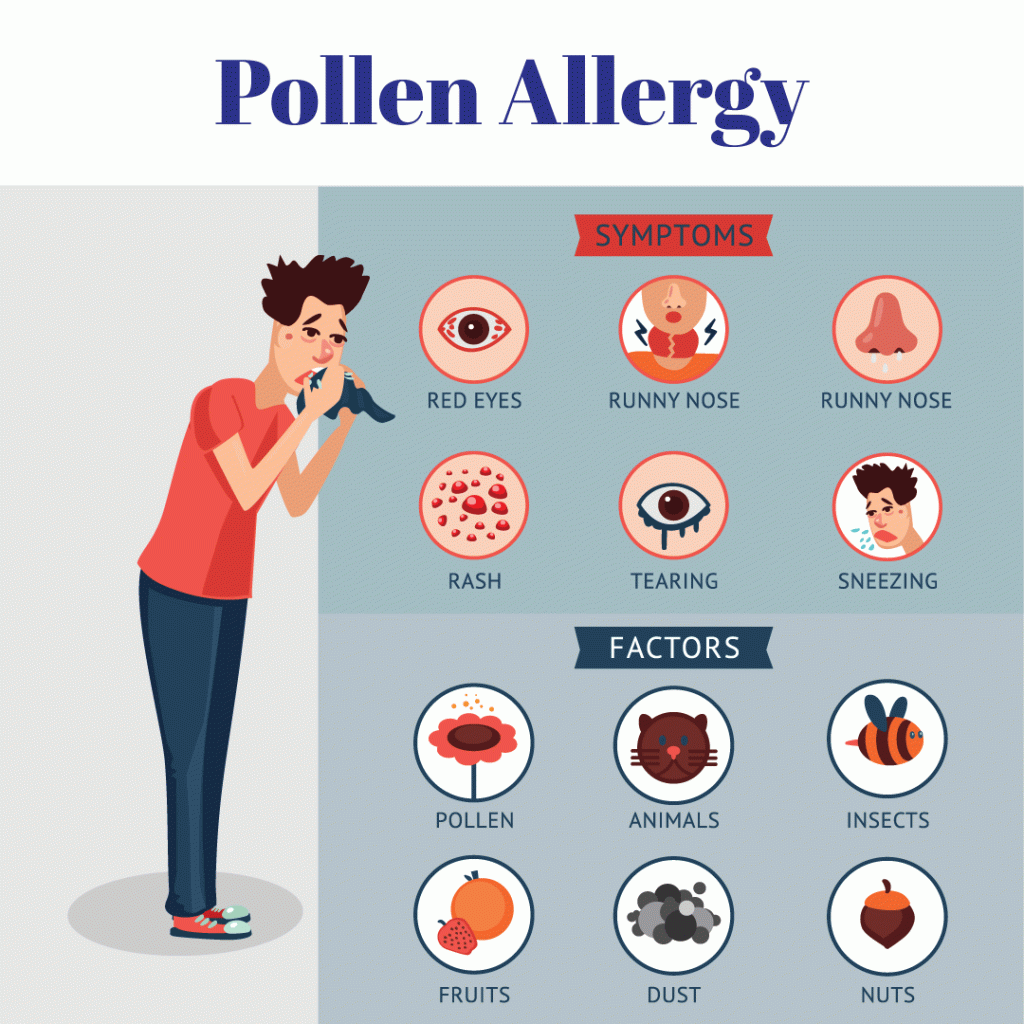Pollen is a fine powder produced by plants during their reproductive process. It can be carried by the wind, insects, or other animals to fertilize other plants of the same species.
Understanding Allergic Reactions to Pollen
In individuals with pollen allergies, the immune system mistakenly identifies pollen as a harmful substance and produces antibodies to fight it, leading to allergic reactions.
Common Symptoms of Pollen Allergies
Symptoms of pollen allergies can vary but often include sneezing, runny or stuffy nose, itchy and watery eyes, coughing, wheezing, and skin reactions like hives or eczema.
Types of Pollen Allergens
Tree Pollen
Tree pollen allergies are common in the spring when trees begin to bloom. Common tree allergens include oak, birch, cedar, and maple.
Grass Pollen
Grass pollen allergies typically peak during late spring and summer months. Common grass allergens include Bermuda grass, Timothy grass, and Ryegrass.
Weed Pollen
Weed pollen allergies are prevalent in the late summer and fall. Common weed allergens include ragweed, sagebrush, pigweed, and tumbleweed.
Other Sources of Pollen Allergies
Apart from trees, grasses, and weeds, other plants like flowers and certain shrubs can also produce pollen that triggers allergic reactions in susceptible individuals.
Pollen Allergy Seasons
Spring Pollen Allergies
Spring is typically associated with tree pollen allergies, as many trees start to bloom during this time.
Summer Pollen Allergies
Grass pollen allergies are predominant during the summer months when grasses are in full bloom.
Fall Pollen Allergies
Fall is characterized by weed pollen allergies, particularly from plants like ragweed, which release large amounts of pollen into the air.
Year-round Pollen Allergies
While pollen allergies are often associated with specific seasons, some individuals may experience symptoms year-round due to indoor plants or mold spores.
Diagnosing Pollen Allergies
Allergy Testing Methods
Allergy testing, including skin prick tests and blood tests, can help identify specific pollen allergens triggering allergic reactions in individuals.
Consulting an Allergist or Immunologist
An allergist or immunologist can interpret allergy test results and provide personalized advice and treatment options for managing pollen allergies.
Managing Pollen Allergies
Avoiding Pollen Exposure
Taking steps to minimize exposure to pollen, such as keeping windows closed, using air purifiers, and avoiding outdoor activities during high pollen count days.
Medications for Pollen Allergies
Over-the-counter and prescription medications, including antihistamines, decongestants, nasal corticosteroids, and allergy shots, can help alleviate pollen allergy symptoms.
Allergy Shots (Immunotherapy)
Immunotherapy involves regular injections of allergens to desensitize the immune system and reduce the severity of allergic reactions over time.
Coping Strategies for Pollen Allergies
Creating an Allergy-Free Environment
Implementing measures to reduce pollen exposure indoors, such as frequent cleaning, using allergen-proof covers on bedding, and maintaining low humidity levels.
Tips for Managing Symptoms
Practical tips for managing pollen allergy symptoms, including nasal irrigation, wearing sunglasses outdoors, and showering after spending time outdoors.
Dealing with Seasonal Changes
Adapting lifestyle habits and routines to cope with seasonal fluctuations in pollen levels, such as monitoring pollen forecasts and planning outdoor activities accordingly.
Living with Pollen Allergies
Pollen Allergies and Quality of Life
The impact of pollen allergies on daily life activities, work productivity, and emotional well-being, along with strategies for improving quality of life despite allergies.
Exploring Alternative Therapies
Alternative approaches for managing pollen allergies, such as herbal supplements, acupuncture, and homeopathic remedies, and their effectiveness.
Support Groups and Resources
Connecting with support groups, online forums, and reputable resources for pollen allergy education, advocacy, and emotional support.
Conclusion
Recap of Key Points
Summarizing essential information covered in the guide, including tips for managing pollen allergies effectively.
Encouragement for Managing Pollen Allergies
Encouraging individuals with pollen allergies to seek proper diagnosis, treatment, and support to lead fulfilling lives despite their allergies.

